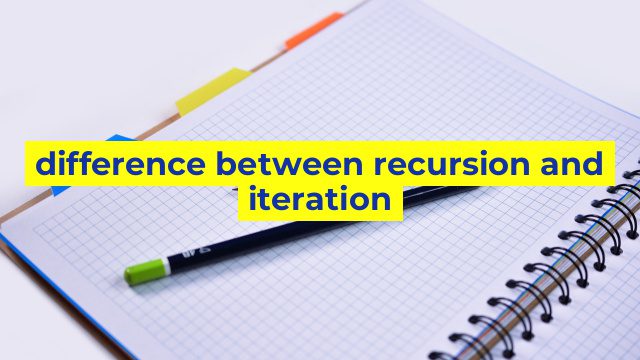The Key Differences Between Recursion and Iteration in Computer Programming
Recursion and iteration are two programming concepts that have fundamentally different approaches to solving problems. Both hinge on the idea of repeating a set of instructions, but they go about it in different ways. Understanding the differences between recursion and iteration is vital for any programmer looking to develop efficient code.
What Is Recursion?
Recursion is a method of solving problems where the solution to a particular problem depends on solving a smaller and simpler version of the same problem. In simpler terms, recursion is when a function calls itself to solve a problem. The recursive function continues to call itself until it reaches the base case or termination condition, at which point it stops.
Recursion can be a powerful and elegant way to solve problems, especially problems with smaller sub-problems that need to be solved in a similar way. Recursion, however, can be very resource-intensive and memory-hungry, which makes it unsuitable for some problems.
What Is Iteration?
Iteration is the process of repeating a set of instructions a certain number of times or until a particular condition is met. It involves using loops such as for, while, and do-while to repeat a set of instructions. Iteration is used extensively in programming as it helps in repeating a set of instructions in a much more efficient and less memory-consuming way.
Iteration loops can often be optimized to run faster and consume less memory. Unlike recursion, loops are more suitable when the same set of instructions needs to be repeated a large number of times.
The Key Differences Between Recursion and Iteration
The primary difference between recursion and iteration is how they approach problem-solving. Recursion approaches a problem by breaking it down into smaller, simpler versions of itself, while iteration repeatedly applies a set of instructions to solve the problem.
Another significant difference is that recursion can be memory-hungry and resource-intensive, making it unsuitable for some problems, while loops are very memory efficient and usually run faster.
Finally, recursion tends to be more elegant and concise than iteration, but at the same time, can be more difficult to understand and debug. Iteration, on the other hand, is often more explicit, which makes it easier to understand and debug.
Conclusion
Recursion and iteration are both fundamental concepts that every programmer should understand. While they differ in approach and memory usage, both can be used effectively to solve a wide range of programming problems. Ultimately, the choice of whether to use recursion or iteration will depend on the specific needs of the problem at hand. By understanding these differences, programmers can choose the best approach to maximize efficiency and optimize their code.
Table difference between recursion and iteration
| Recursion | Iteration |
|---|---|
| Recursion is a process in which a function calls itself. | Iteration is a process in which a loop repeats a particular code block. |
| Recursion uses function calls to solve problems by breaking them into smaller sub-problems. | Iteration uses loops to solve problems by repeating a particular code block until a specific condition is met. |
| Recursion tends to be more intuitive for problems that have a naturally recursive structure, such as tree traversal. | Iteration is generally more efficient than recursion for problems that don’t require a recursive solution. |
| Recursion can be less efficient than iteration due to function call overhead and the potential for stack overflow. | Iteration is usually more straightforward and easier to understand than recursion. |
